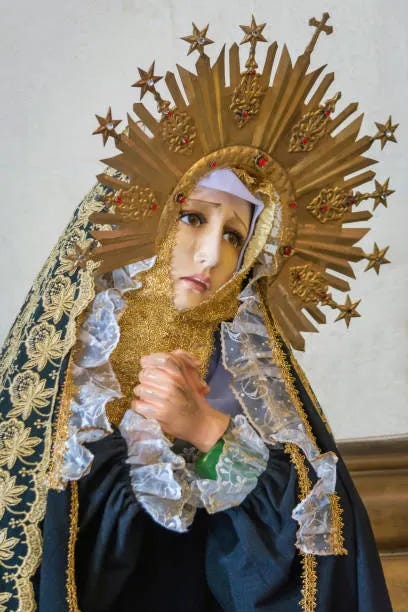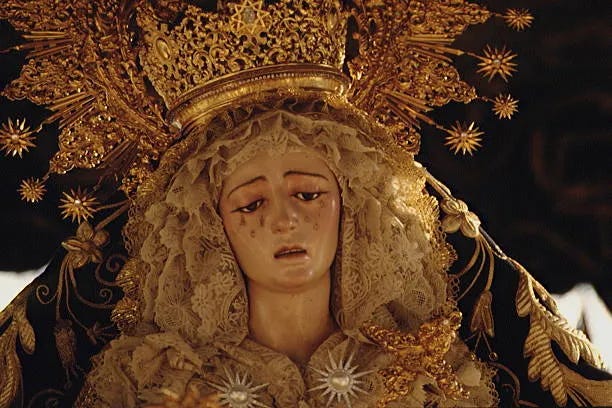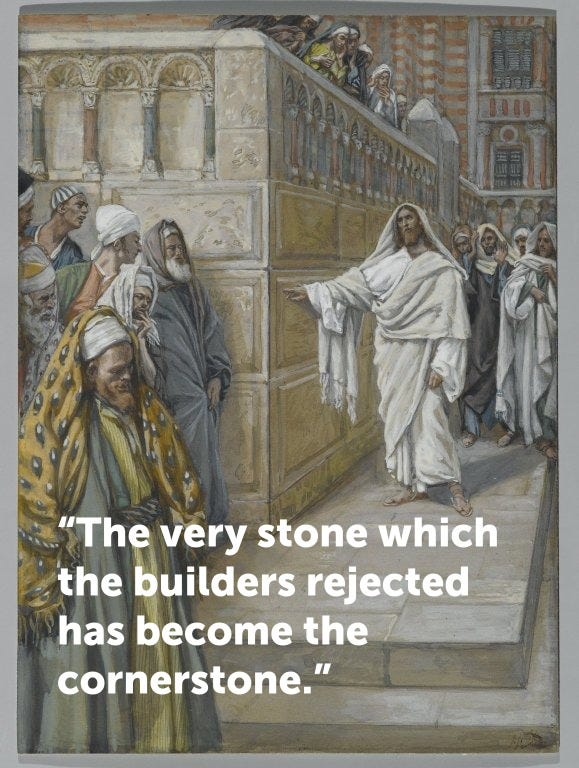We continue our 9 day Novena to Our Lady of Sorrows which commenced on the Feast of Our Lady of Sorrows and will conclude on Holy Saturday. We are praying for the following intentions:
The repose of the soul of the recently deceased, Fr. Paul Mangiafico
reparation for all blasphemies against Our Lord in the Blessed Sacrament
reparation for all blasphemies against the Blessed Virgin Mary
The Feast of the Seven Sorrows in September is devoted to all of her Seven Sorrows; the feast today focuses more specifically the last four of those -- i.e., on what she suffered during Passiontide. In other words, the feeling of the day is akin to what one feels when looking at Michelangelo's Pieta: we imagine Our Lady watching her Son enduring His betrayal, His arrest, His torture, His crucifixion, His death, and His burial.1
Most Blessed and afflicted Virgin, Queen of Martyrs, who didst stand generously beneath the cross, beholding the agony of thy dying Son; by the sword of sorrow which then pierced thy soul, by the sufferings of thy sorrowful life, by the unutterable joy which now more than repays thee for them; look down with a mother’s pity and tenderness, as I kneel before thee to compassionate thy sorrows, and to lay my petition with childlike confidence in thy wounded heart. I beg of thee, O my Mother, to plead continually for me with thy Son, since He can refuse thee nothing, and through the merits of His most sacred Passion and Death, together with thy own sufferings at the foot of the cross, so to touch His Sacred Heart, that I may obtain my request,
Here pause and name the favours which you are asking Our Sorrowful Mother to obtain for you through this Novena. (Let your secondary intention be to pray for the intentions of all the people making this Novena})
For to whom shall I fly in my wants and miseries, if not to thee, O Mother of mercy, who, having so deeply drunk the chalice of thy Son, canst most pity us poor exiles, still doomed to sigh in this vale of tears? Offer to Jesus but one drop of His Precious Blood, but one pang of His adorable Heart; remind Him that thou art our life, our sweetness, and our hope, and thou wilt obtain what I ask, through Jesus Christ our Lord. Amen.
Hail Mary, Virgin Most Sorrowful, pray for us (seven times)
Tuesday in Holy Week
Morning Meditation
"PRECIOUS IN THE SIGHT OF THE LORD IS THE DEATH OF HIS SAINTS."
Precious in the sight of the Lord is the death of his saints. (Ps. cxv. 15). And why is the death of the Saints called precious? "Because," answers St. Bernard, "it is so rich in blessings which deserve to be purchased at any price." O death worthy of being loved, who can fear thee since thou art the end of all toils, and the beginning of eternal life!
I.
Precious in the sight of the Lord is the death of his saints. (Ps. cxv. 15). Why is the death of the Saints called precious? "Because," answers St. Bernard, "it is so rich in blessings which deserve to be purchased at any price."
Some persons, attached to this world, would wish that there was no such thing as death; but St. Augustine says: "What is it to live long upon this earth, except to endure long sufferings?" "The miseries and difficulties that constantly weary us in this present life are so great," says St. Ambrose, "that death seems rather a relief than a punishment."
Death terrifies sinners, because they know that from the first death, if they die in sin, they will pass to the second death, which is eternal; but it does not terrify good souls, who, trusting in the merits of Jesus Christ, have sufficient signs to give them a moral assurance that they are in the grace of God. Wherefore, those words, "Depart, Christian soul, from this world," which are so terrible to those who die against their will, do not afflict the Saints who preserve their hearts free from worldly love, and with a true affection can continue repeating, "My God and my All."
To these, death is not a torment, but a rest from the pains they have suffered in struggling with temptations, and in quieting their scruples, and no fear now of offending God; so that what St. John writes of them is fulfilled: Blessed are the dead who die in the Lord! Yea, saith the Spirit, that they may rest from their labours. (Apoc. xiv. 13). He that dies loving God is not disturbed by the pains that death brings; but rather it is a joy to such persons to offer them to God, as the last gifts of their life. Oh, what peace is experienced by him who dies, when he has abandoned himself into the arms of Jesus Christ Who chose for Himself a death of bitterness and desolation, that He might obtain for us a death of sweetness and resignation!
O my Jesus, Thou art my Judge, but Thou art also my Redeemer Who hast died to save me. From my first sin I have deserved to be condemned to hell, but in Thy mercy Thou hast given me a deep sorrow for my sins, wherefore I confidently hope that now Thou hast pardoned me. I have not deserved to love Thee; but with Thy gifts Thou hast drawn me to Thy love. If it is Thy will that this sickness shall bring death to me, I willingly receive it. I see truly that I do not now deserve to enter Paradise; I go contentedly to Purgatory, to suffer as much as it pleases Thee. There my greatest pain will be to continue far from Thee, and I shall sigh to come and see Thee and love Thee face to face. Therefore, O my beloved Saviour, have mercy upon me.
II.
And what else is this present life, but a state of perpetual peril of losing God? "We walk amidst snares," says St. Ambrose; amidst the deceits of enemies who seek to cause us to lose the Divine grace. Therefore St. Teresa, every time that the clock struck, gave thanks to God that another hour of struggle and peril had passed without sin; and therefore she rejoiced at the tidings of her coming death, considering that her struggles were over, and the time was near for her to depart and behold her God.
In this present life we cannot live without defects. This is the motive that makes souls that love God even desire death. It was this thought that, at the time of death, gladdened Father Vincent Carafa, when he said: "Now that I finish my life, I cease to displease God." A certain man gave directions to his attendants, that at the time of his death they should often repeat to him these words: "Comfort thyself, because the time is near when thou wilt no more offend God."
And what else is this body to us but a prison in which the soul is incarcerated, so that it cannot depart to unite itself to God? On this account, St. Francis, inflamed with love, at the hour of his death cried out with the Prophet: Take my soul out of prison. O Lord, deliver me from this prison which prevents me from seeing Thee. O death worthy of being loved, who can fear thee and not desire thee, since thou art the end of all toils, and the beginning of eternal life! St. Pionius, the Martyr, standing by the instruments of death, showed himself so full of joy, that the people who stood by wondered at his delight, and asked him how he could be so happy when he was just going to die. "You are mistaken," said he, "you are mistaken; I am hastening not to death, but to life."
O most sweet Jesus, I thank Thee for not having called me to death when I was under Thy wrath, and for having won over my soul with such gentle means as Thou hast employed. When I think of the displeasure I have caused Thee, I am ready to die with grief. This my soul, which was lost, I now commit wholly into Thy hands. Into thy hands I commend my spirit! Remember, O Lord, that Thou hast redeemed it with Thy death. I love Thee, O Infinite Goodness! And I desire to depart quickly from this life, that I may come and love Thee with a more perfect love in Heaven. And so long as I shall continue to live on this earth, make me continually comprehend better my obligation to love Thee. O my God, receive me; I give myself wholly to Thee, and I trust in Thee through the merits of Jesus Christ. I also trust in thy intercession, O Mary, my hope!2
https://fisheaters.com/customslent10.html
https://www.religiousbookshelf.com/meditations-and-readings/day/2152-Tuesday-in-Holy-Week.html








